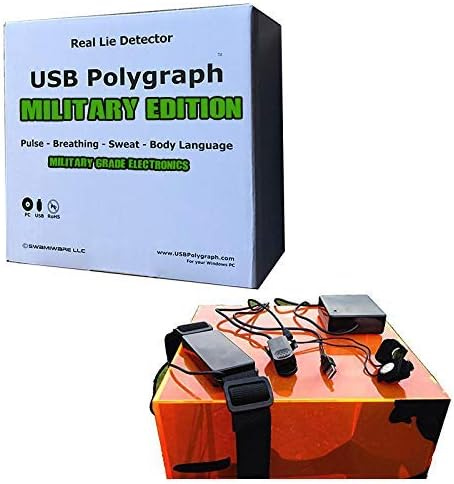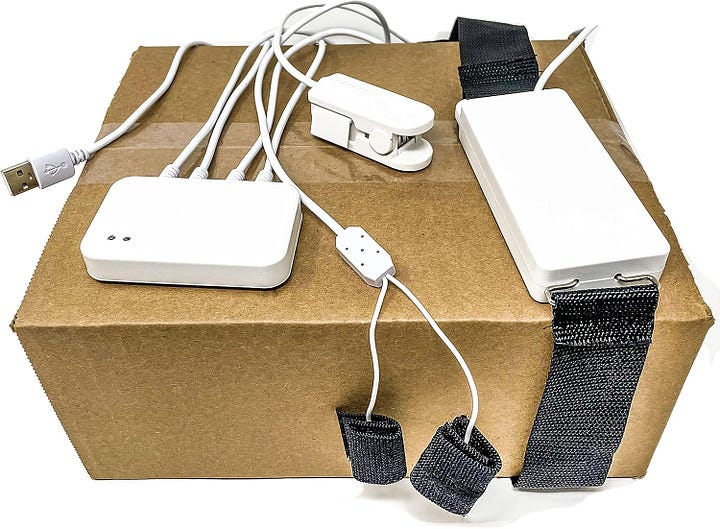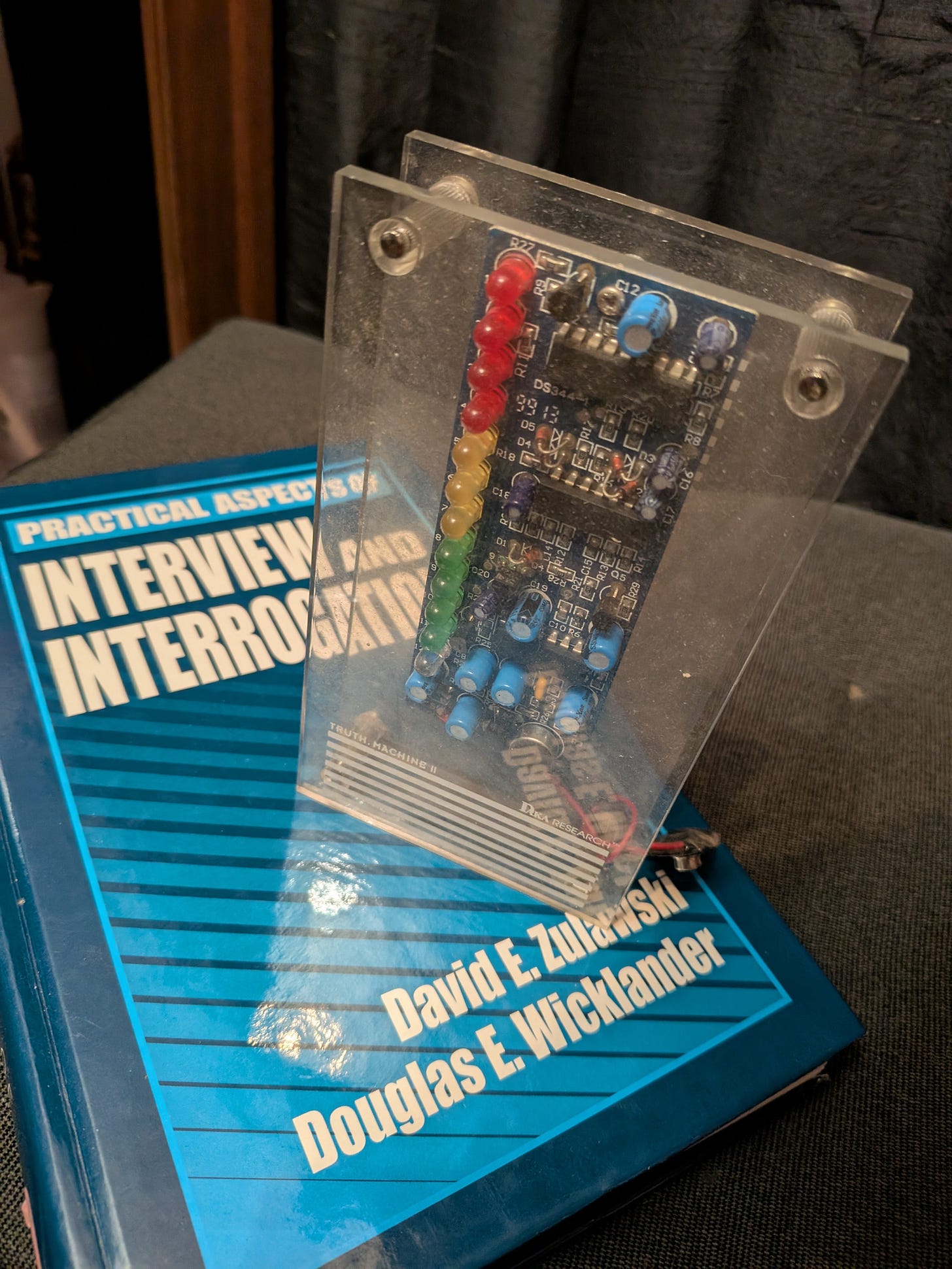The Polygraph Trap: How To Beat The Lie Detector
The Loyalty-obsessed Trump administration is using flawed Polygraph lie detectors to intimidate suspected whistle-blowers. Here's how to beat them.
The Trump administration, under the influence of ‘President Musk’, is paranoid, obsessed with loyalty, and ready to put far too much faith in flawed technology. We are seeing a witch-hunt culture emerge, backed by pseudo-scientific polygraphs. As far back as 2019 it was being reported that a Paranoid Trump was becoming obsessed with lie detectors. That will - as they intend, intimidate whistle-blowers. It could also help them tear themselves apart.
One Man’s Leaker is another man’s Whistle-Blower
“We have identified criminal leakers within the Department of Homeland Security and are preparing to refer these perpetrators to the Justice Department for felony prosecutions. These individuals face up to 10 years in federal prison. We will find and root out all leakers. They will face prison time & we will get justice for the American people.”
Secretary Kristi Noem
Whistle-blowers are one of the last lines of defence against authoritarian corruption and abuse of power. Journalists must be able to protect their sources, and sources must be able to blow the whistle on wrongdoings in the public interest. These are anathema to Authoritarian regimes obsessed with loyalty, secrecy and control. Instead of being protected, they are being hunted. And now, in the USA, hunters are using a tool long discredited by science: the polygraph.
Recent reports reveal that the US Department of Homeland Security (DHS) is using polygraph tests to track down leakers within its ranks despite overwhelming evidence that lie detector tests are unreliable (The Hill, 2024). South Dakota Governor Kristi Noem is subjecting state employees to polygraphs to 'root out dissent' within her administration (Irish Star, 2024).
This resurgence of the polygraph is not about truth but power.
Despite their reputation in pop culture, polygraphs do not detect lies. They measure stress responses, which can be triggered by anything from anxiety to fatigue. Yet governments, intelligence agencies, and corporations continue to use them to intimidate, control, and silence dissent.
The weaponisation of lie detectors against whistle-blowers represents a growing authoritarian trend—one that history warns us to take seriously. But before we examine the implications, it's crucial to understand what polygraphs are and why they are deeply flawed.
The Science of the Polygraph: How It Works (and Why It's Flawed)
"Most psychologists agree that there is little evidence that polygraph tests can accurately detect lies."
American Psychological Association
This is a bit of equipment I've had lying around for 25 or 30 years.
The "Truth Machine II" measures vocal 'stress', which may - or may not be - indicative of deception. A Polygraph is a fancier version, but that's not to say it's much more reliable. A polygraph, often misleadingly called a "lie detector," does not detect lies. Instead, the bog standard polygraph usually measures three key physiological responses:
Heart rate and blood pressure (cardiograph)
Breathing patterns (pneumograph)
Sweat gland activity (galvanic skin response)
Invented by Californian police, polygraph theory is simple but flawed: when someone lies, their body reacts with increased stress, faster heartbeat, and sweating, which the polygraph records as "deception" (National Academy of Sciences, 2003).
However, this assumption is scientifically unsound:
Truthful people can fail due to anxiety or nervousness.
Deceptive people can pass if they remain calm, are naturally unreactive, or know countermeasures.
False positives and false negatives are common, with accuracy estimates ranging from 50% to 87%—barely better than a coin flip (National Research Council, 2003).
A landmark report by the National Academy of Sciences concluded that polygraphs are unreliable for security screening and are easily manipulated (Stanford Virtual Assistant Lab, 2024). Despite this, they remain in widespread use—not because they work, but because they serve a psychological and political purpose.
The traditional measures are not complicated to take, in fact for a couple of hundred bucks you can buy your own ‘usb polygraph’ . It’s less sophisticated than an Apple Watch or Fitbit.


More Science, More Problems - “Polygraph Plus”
Modern Lie Detection Methods
While polygraphs remain the most well-known deception detection tool, new technologies that claim to improve its flaws have emerged. However, many of these methods suffer from similar scientific shortcomings:
1. Voice Stress Analysis (VSA)
Like my old “Truth Machine II” Some agencies now use voice stress analysis (VSA), which measures microtremors in the voice to detect stress. However, multiple studies have found that VSA is no more reliable than chance, as voice stress can be influenced by numerous factors unrelated to deception. (Polygraph.org, 2023).
2. Micro-expressions and Facial Analysis
Some modern security agencies analyse micro-expressions—involuntary facial movements lasting fractions of a second—to detect lies. While some research supports this method, it remains highly subjective and dependent on the examiner's interpretation (Morgan Polygraph, 2024).
3. Eye-tracking and Pupil Dilation
Newer AI-driven systems claim to detect deception by tracking pupil dilation and eye movement patterns. While this method may provide valuable data, there is no definitive link between pupil dilation and lying, making its effectiveness questionable (Lie Detector Test, 2024).
Despite technological advancements, no deception detection method has proven consistently reliable. Most remain tools of intimidation rather than truth verification.
4. Truth Serum
So-called "truth serums," like sodium thiopental and scopolamine, have long been depicted in popular culture as fool-proof ways to extract information. These drugs do not compel honesty but somewhat lower inhibitions and impair cognitive function, making subjects more suggestible and prone to confabulation. They get you drunk, basically. The American Psychological Association and legal authorities widely dismiss truth serums as unreliable, and their use is generally inadmissible in court. While they may increase talkativeness, there is no scientific evidence that they guarantee truthful statements.
Whistle-blowers, Authoritarianism, and the Crackdown on Truth
Why Whistle-blowers Matter
A free society relies on whistle-blowers to expose corruption, wrongdoing, and abuses of power. From Edward Snowden's revelations on mass surveillance to the Pentagon Papers uncovering government deception during the Vietnam War, history has shown that whistle-blowers play a crucial role in holding power to account (The Guardian, 2023). But whistle-blowers have always been targeted by those in power. And as history shows, authoritarian regimes often use pseudo-scientific tools like polygraphs to hunt and discredit them.
They can also act as a self-fulfilling prophecy. MIT looked at new AI tools to detect deception and found that even when they worked, they created more problems.
"In some ways, the tool was helpful—the people who made use of it were better at spotting lies. But they also led people to make a lot more accusations."
MIT Technology Review
We know from books like SPYCATCHER that when agencies go on a mole-hunt, they can tear themselves apart without even knowing for sure the mole exists if they have caught the right person or fired loyal people. If the Trump administration, which has already under the influence of President Musk shown itself paranoid and ready to put far too much faith in technology.
Polygraphs as a Tool of Control
“We can, should, and will polygraph personnel”
DHS secretary Tricia McLaughlin
The dirty secret is that Polygraphs don't need to work scientifically because they work psychologically. They are an interrogation technique. If you are innocent but under suspicion, they can make you feel and appear guilty. If you are guilty, the apprehension of them could help give you away.
“The possibility was viewed as “more of a scare tactic” to force people “to sort of fess up to see if they can ferret out leakers or to try to prevent others from leaking any further,” a former White House official said.”
POLITICO - 2019
It will be interesting to hear if the Polygraphs being used by Trump Appointees stick to the supposed approved guidelines on Prohibitive Inquiries -
“Prohibitive Inquiries: Personal and intrusive questions have no place in a properly conducted polygraph examination. Many state licensing laws, the Employee Polygraph Protection Act, as well as the American Polygraph Association, have so stated in language similar to the following:
NO EXAMINER SHOULD INQUIRE INTO ANY OF THE FOLLOWING AREAS DURING PRE-EMPLOYMENT OR PERIODIC EMPLOYMENT EXAMINATIONS:
Religious beliefs or affiliations (unless specifically relevant to the job)
Beliefs or opinions regarding racial matters (except to the extent that any such biases could interfere with one’s ability to fairly and objectively perform his or her job)
Political beliefs or affiliations
Beliefs, affiliations or lawful activities regarding unions or labor organizations
Lawful sexual preferences or activities”
The American Polygraph Association
C.L.E.A.R. Yourself - How to Beat the Polygraph
The good news? Polygraphs can be beaten—not through deception, but by understanding how they work and their flaws. Here's how:
C. Control your breathing
L. Lower your stress response
E. Excite your baseline
A. Answer Consistently
R. Refute the Results
1. Control Your Breathing
Polygraphs rely on breathing changes to detect nervousness. The trick? Maintain steady, controlled breathing throughout the test. Avoid deep breaths or irregular patterns that might signal anxiety.
2. Lower Your Stress Response
Before the test, practice relaxation techniques like slow breathing and progressive muscle relaxation.
If you feel nervous, channel your focus into slow, deliberate thoughts.
3. Excite Your Baseline
Use Countermeasures to Control Baselines when being asked initial questions. Polygraph examiners establish a baseline response using irrelevant questions ("Is your name John?"). A simple trick: slightly increase stress responses on control questions (e.g., by biting your tongue, tensing your toes, cramping a muscle). This makes honest responses appear less significant.
4. Answer Consistently
Examiners look for inconsistencies. Even if you're innocent, don't overthink your answers. Keep responses simple and direct—don't explain too much.
5. Refute the Results
If you're accused of deception:
Demand a retest with a different examiner.
Ask for the complete polygraph charts and scoring method.
Point out known inaccuracies and legal limitations.
Refute accusations with evidence to create doubt in the results.
In the US, polygraphs are not admissible in most courts due to their unreliability (National Academy of Sciences, 2003). But given the new administration's contempt of legal process and capture of the supreme legislature, who knows what protection that is?
The Bark is Worse than the Bite
Polygraphs are junk science dressed up as law enforcement. They don't detect lies—they measure stress. And stress doesn't equal guilt. Yet governments continue to use them to intimidate whistle-blowers, silence dissent, and enforce political loyalty tests.
The DHS crackdown is probably the tip of the Iceberg. Under federal law and policy designed to encourage whistleblowing, whistle-blowers are granted multiple protections, including the right to anonymity and protection from retaliation. However, these safeguards may not apply for long under Trump.
The leak that seemed to start Trump’s obsession was his leaked call with President Zelenskyy who refused to be blackmailed into investigating Hunter Biden in return for aid not being blocked.
the use of polygraphs by authoritarian leaders, and the renewed push for them in corporate settings should concern anyone who values truth and accountability. The best defence against polygraphs? Knowledge. Understanding how they work—and how they fail—is the first step in resisting their misuse.
Notes
National Academy of Sciences. (2003). The Polygraph and Lie Detection. The National Academies Press. Retrieved from https://nap.nationalacademies.org/read/10420/chapter/5
The Hill. (2024). DHS using polygraph tests to find leakers, reports. Retrieved from https://thehill.com/policy/national-security/5184490-dhs-using-polygraph-tests-to-find-leakers-reports/
American Psychological Association. The truth about lie detectors (aka polygraph tests). Retrieved from https://www.apa.org/research/action/polygraph
MIT Technology Review. (2024, July 5). AI lie detectors are better than humans at spotting lies. Retrieved from https://www.technologyreview.com/2024/07/05/1094703/ai-lie-detectors-are-better-than-humans-at-spotting-lies/
Irish Star. (2024). Kristi Noem using polygraph test to root out disloyalty. Retrieved from https://www.irishstar.com/news/us-news/kristi-noem-using-polygraph-test-34824327.
Caputo, M. (2019, October 8). Trump’s obsession with polygraphs spooks leakers inside his administration. Politico. https://www.politico.com/news/2019/10/08/trump-obsession-polygraphs-leaks-038431
The Guardian. (2023). Edward Snowden and the NSA surveillance revelations. Retrieved from https://www.theguardian.com/us-news/edward-snowden-nsa-surveillance.







